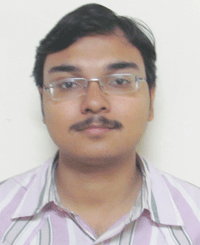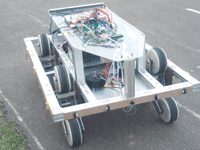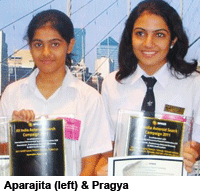 Necessity is not always the mother of invention. In some cases, inventions are born out of a creative mind. For Subhagato Dutta (21), a fourth-year electrical engineering student at the Indian Institute of Technology, Kharagpur, it was the latter stimulus that prompted him to design a self-driven ‘autonomous vehicle’ that can navigate any terrain — gravel, sand, staircase or plain road. In an online autonomous vehicle design competition organised by the Defence Research and Design Organisation (DRDO) last year, in which 240 teams from across India participated, Subhagato was awarded the first prize and cheque of Rs.1 lakh as funding to develop the prototype.
Necessity is not always the mother of invention. In some cases, inventions are born out of a creative mind. For Subhagato Dutta (21), a fourth-year electrical engineering student at the Indian Institute of Technology, Kharagpur, it was the latter stimulus that prompted him to design a self-driven ‘autonomous vehicle’ that can navigate any terrain — gravel, sand, staircase or plain road. In an online autonomous vehicle design competition organised by the Defence Research and Design Organisation (DRDO) last year, in which 240 teams from across India participated, Subhagato was awarded the first prize and cheque of Rs.1 lakh as funding to develop the prototype.
Born to Dr. S.N. Dutta, an eye specialist and mother Supriti, professor of botany at the Rishi Bankim Chandra College for Women, Naihati, Subhagato and his brother Akash Nil have done their parents proud right from child-hood. An alumnus of Ramakrishna Mission Boys’ Home, Rahara, Subha-gato averaged 92.4 percent in class X and 81.1 percent in the class XII school-leaving exams. Meanwhile, his equally brilliant brother Akash Nil, an undergrad at the Massachusetts Institute of Technology (MIT), USA recently bagged a gold medal in the International Mathematical Olympiad.
 The autonomous vehicle designed by Subhagato has a camera and sensors to identify obstacles. “The camera captures the foreground image which is then processed by a computer which runs an image-processing code together with a distance measurement algorithm which gives the vehicle distance perception of features of the land-scape preceding the vehicle,” explains Subhagato. The vehicle’s prototype was exhibited in the second phase of the competition in October 2010 in Chennai, and won two awards for best engineering design and vehicle dynamics.
The autonomous vehicle designed by Subhagato has a camera and sensors to identify obstacles. “The camera captures the foreground image which is then processed by a computer which runs an image-processing code together with a distance measurement algorithm which gives the vehicle distance perception of features of the land-scape preceding the vehicle,” explains Subhagato. The vehicle’s prototype was exhibited in the second phase of the competition in October 2010 in Chennai, and won two awards for best engineering design and vehicle dynamics.
Nor is the self-navigating auto-nomous vehicle the sole invention of this promising young designer-cum-inventor. In 2011, Texas Instruments — the world’s third largest semi-conductor manufacturing company — awarded Subhagato the third prize (including $4,000) for an innovation based on affordable telecom-munication technology in its TI Analog Design Contest 2010.
A sports aficionado and “self-confessed geek,” it’s not surprising that Subhagato is all set for an R&D (research and development) career in Indian industry.
Wind in your sails!
Baishali Mukherjee (Kolkata)
Aprajita Aggarwal & Pragya Chawla
Young minds have always been fascinated with outer space. But Aprajita Aggarwal and Pragya Chawla both aged 17, have taken their fascination into the realm of exploration by discovering a rare Trojan asteroid on June 29, 2011, during phase 1 of the All India Asteroid Search Campaign (AIASC), held in Delhi between May 15-June 30.
 AIASC is an annual event conducted by the Delhi-based Science Populari-sation Association of Communicators and Educators (SPACE) in collaboration with the International Astronomical Search Collaboration (IASC), an educational outreach programme for secondary school and college students worldwide. “Trojan is a rare asteroid which is in the orbit of Jupiter and difficult to spot. The discovery was remarkable as this was the first time in the history of this international campaign run by IASC that students have found a Trojan,” explains C.B. Devgun, director of SPACE.
AIASC is an annual event conducted by the Delhi-based Science Populari-sation Association of Communicators and Educators (SPACE) in collaboration with the International Astronomical Search Collaboration (IASC), an educational outreach programme for secondary school and college students worldwide. “Trojan is a rare asteroid which is in the orbit of Jupiter and difficult to spot. The discovery was remarkable as this was the first time in the history of this international campaign run by IASC that students have found a Trojan,” explains C.B. Devgun, director of SPACE.
Class XI and XII students of Bal Bharati Public School, Delhi, Aprajita and Pragya have been stargazers since class VI, as members of the school’s astronomy club. They participated in AIASC last year as well, without much success. But their persistence and passion to pursue the mysteries of the galaxy bore fruit with the exceptional discovery of a Trojan asteroid this year.
On June 4, IASC confirmed their discovery of asteroid 2011 MV9, granting it preliminary status. After a rigorous authentication process, on June 29, much to the jubilation of this young duo, the Minor Planet Centre in USA, under the auspices of the International Astronomical Union, confirmed their discovery of a “very rare” Trojan asteroid captured in Jupiter’s gravitational orbit. Prof. Patrick Miller, the director of IASC announced the historic discovery at a meeting of Global Hands-On Universe on July 25 in Wisconsin, USA.
Aprajita, whose father is a senior IT professional with ITC Infosystems and mother a homemaker, has set her sights on aeronautics, while Pragya, the daughter of a chartered accountant father and homemaker mother, is keen to study astrophysics. “The most exciting aspect of this discovery is that after a period of two to six years, when the orbit of the asteroid is confirmed, we will get the chance to give this asteroid a name of our choice,” says Pragya.
A determined duo with stars in their eyes!
Payal Mahajan (Gurgaon)